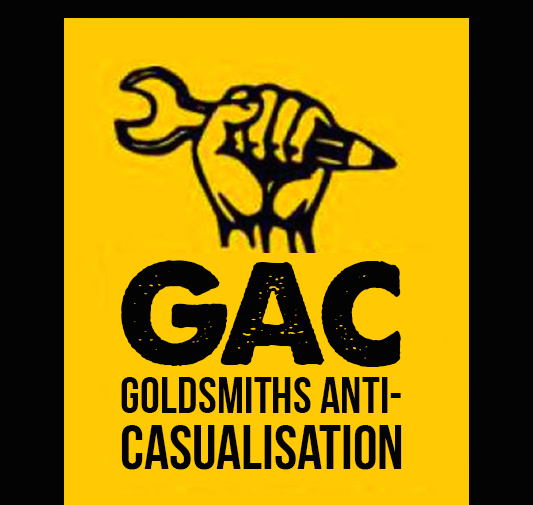The GUCU anti-casualisation reps have made their first steps toward tackling the issues of casualization at Goldsmiths on the institutional level and on the campaign front. It has been agreed that GUCU will conduct a review of the operationalisation of the assimilation agreement for AL/GTT/Fractionals in a working group that will include the head of Human Resources, Andy Lamb, and other relevant stakeholders. Goldsmiths commenced the operationalisation of the assimilation agreement in the 2013/14 academic year but it has become apparent from our anti-casualisation meetings that there are pronounced discrepancies in the way that this (binding) agreement is being implemented across different departments. Provisional dates have been proposed for the first meeting of this working group but as yet nothing has been confirmed by Goldsmiths management. We are also awaiting a response from Andy Lamb to our request for data regarding the operationalisation of the assimilation agreement at department level. In the meantime, we are attempting to gather this data ourselves.
GUCU members can contribute to the anti-casualisation campaign by helping us collect the following information:
– A pool of CHC (spreadsheet part of contract) samples in use for ALs and GTTs across all departments. These can be anonymised before passing them on to us.
– How your department recruits ALs/GTTs/Fractional staff
– Figures for ALs/GTTs/Fractionals for each department – information relating to any broad departmental training provided to ALs/GTTs/Fractional staff
While the working group provides a route for us to address existing issues of casualisation at the level of institutional policy, the broader ideological battle over precarity in higher education is where we will be putting most of our energies. After our first three meetings, the anti-casualisation group has co-ordinated a number of different projects to establish a clearer picture of the scale and effect of casualization at Goldsmiths today. We are conducting several data gathering initiatives, the main ones are: 1) aiming to clarify the statistical make-up of academic contracts at Goldsmiths (quantitative), 2) a survey to gain a wide pool of data around precarious contracts across the college (quantitative and qualitative) and 3) aiming to expose the personal experiences of casualised staff in the college (qualitative). Following the success of the testimony format used during the cleaners’ campaign, we are aiming to inform the wider community about the current work-life situations of precarious academic staff to raise consciousness in the college about the distinct hardships that casualization is causing and exacerbating.
One of the major issues we are facing at the moment is establishing contact with AL’s/GTTs/Fractional staff. We are currently looking for representative GTTs and ALs from all departments to be able to conduct the campaign. If you are or are working with any casualised staff please forward details of our next meeting and the anti-casualisation mailing list. To join the campaign mailing list please email: anticasGoldsmiths+subscribe@groups.io
We think the difficulty of reaching casualised staff (a reflection of how isolated casualised staff are in the institution) could be overcome by establishing UCU paid AL/GTT/fractional representatives for every department. This would be a significant step in advancing channels of communication between casualised staff and GUCU. Not only would this provide anti-casualisation reps a sustainable way of building and co-ordinating their campaign but would better enable GUCU to amplify the voices of this part of the Goldsmiths community during national campaigns. We will be putting forward a motion in the December GUCU executive meeting to fund paid departmental rep roles, as a trial for the academic year 2018/19 to commence with immediate effect.
We are also keen to avoid framing this as an issue specific to academic staff. We want to frame it as one area among many others where the integration of precarious and temporary working conditions is becoming normalised within the university. In order to establish connections between the conditions and struggles of ALL precarious workers at Goldsmiths we have created a blog documenting the various campaigns that are taking place on this front. Contributions are welcome, to raise issues please use the contact form on the blog: https://precariousatgold.wordpress.com/
We are hoping to grow the campaign to deal with the magnitude of the challenges we are currently facing. We warmly welcome new campaigners our Anti-Casualisation meetings which are usually held on Wednesday afternoons. Details of the next meeting will be posted.
For advice on these issues, or if you can help with any info requested contact your reps on the following: a.goh@gold.ac.uk, robertomozzachiodi@gmail.com, s.westman@gold.ac.uk
In solidarity
Annie, Roberto and Sue
GUCU Anti-Cas reps
